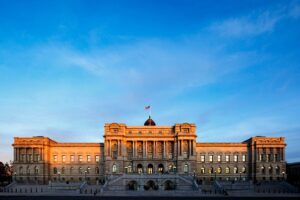The Library of Congress has received a $2.5 million grant from Lilly Endowment Inc., through its Religion and Cultural Institutions Initiative. The grant will support the launch of Library programs to enhance public understanding of religious cultures in Africa, the Middle East and Central Asia over a five-year period.
 This is the largest Lilly Endowment grant to the Library of Congress, and the largest private gift in the history of the African and Middle Eastern Division. The funding will help create programs to boost awareness of the major and traditional faiths practiced in the regions, including indigenous African religious traditions, Christianity, Islam and Judaism, among others, and their impact in daily life and culture.
This is the largest Lilly Endowment grant to the Library of Congress, and the largest private gift in the history of the African and Middle Eastern Division. The funding will help create programs to boost awareness of the major and traditional faiths practiced in the regions, including indigenous African religious traditions, Christianity, Islam and Judaism, among others, and their impact in daily life and culture.
“Africa and the Middle East constitute the birthplace of humanity, the cradle of civilization, and the origin of Abrahamic traditions. They are exceptionally fertile grounds for examining the beauty, complexity and evolution of human culture,” said Lanisa Kitchiner, chief of the Library’s African and Middle Eastern Division.
“The Lilly Endowment grant is transformational. I am excited to lead the Library’s effort to mobilize its vast repository of relevant materials to facilitate greater awareness about African and Middle Eastern life and culture through programs that promote agency, tolerance, empathy and respect,” Kitchiner added.
Religion is deeply embedded in the local cultures and practices across Africa, the Middle East and Central Asia, and religious traditions and cultures reflect the complexity of multiethnic societies in the region.
The grant announced today will broaden engagement with diverse communities, particularly those that are represented in the collections of the African and Middle East Division at the Library, increase access to scholars and the public to those repositories through digitization, and help foster a dynamic dialogue around them.
The Library of Congress is one of 16 organizations from across the United States receiving grants through the latest round of the endowment’s Religion and Cultural Institutions Initiative. The group includes fine arts museums, libraries, historical societies and history museums, museums dedicated to serving children and families and museums dedicated to particular geographic locations and cultures.
“Museums and cultural institutions are trusted organizations and play an important role in teaching the American public about the world around them,” said Christopher Coble, Lilly Endowment’s vice president for religion. “These organizations will use the grants to help visitors understand and appreciate the significant impact religion has had and continues to have on society in the United States and around the globe. Our hope is that these efforts will promote greater knowledge about and respect for people of diverse religious traditions.”
Projects supported by the grant will include digitization; fellowships; an artist-in-residence program; a film and a book produced in-house; research and development; and various public talks and programs.
The published book will incorporate five essays from high-profile experts focusing on the life and work of Omar ibn Said, a Fula Islamic scholar from present-day Senegal who was enslaved and sent to the United States in 1807. The documentary film will retrace the steps of ibn Said, detailing little-known facts about his birthplace in Futa Toro, in West Africa, and how it shaped his life, his incredible journey to South Carolina, and his enduring legacy.
The Library of Congress is the world’s largest library, offering access to the creative record of the United States — and extensive materials from around the world — both on-site and online. It is the main research arm of the U.S. Congress and the home of the U.S. Copyright Office.


